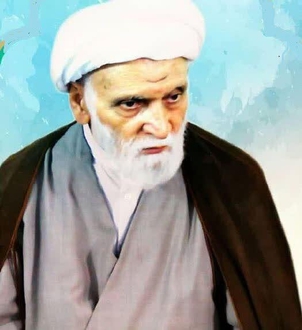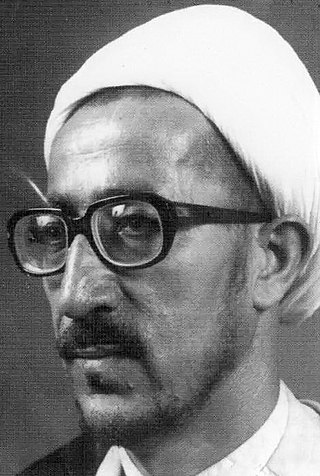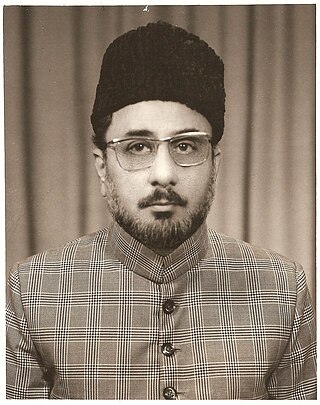
Muhammad Taqi Misbah YazdiGiwachi was an Iranian Shia scholar, political theorist and philosopher who served as the spiritual leader of the Front of Islamic Revolution Stability.

Ayatollah Mohammad Mofatteh was an Iranian philosopher, theologian, and political activist, born in Famenin, Hamadan, Iran. After he finished his primary education in Hamadan, he left for the Islamic Seminary in Qom, where he was taught by reputable teachers such as Ayatollah Muhammad Hujjat Kuh-Kamari, Ayatollah Sayyed Hossein Tabatabei Borujerdi, Grand Ayatollah Sayyid Ruhollah Mūsavi Khomeini, Ayatollah Mohammad-Reza Golpaygani, Ayatollah Marashi, and Allameh Tabatabie. He continued his studies at seminary and at the same time studied philosophy at Tehran University, where he earned his PhD and became a professor and a dean of colleague.

Mazandaran University of Medical Sciences is a medical university in Sari, Mazandaran province, Iran. It is one of the top medical universities in Iran.

Ayatollah Ebrahim Amini was an Iranian conservative politician who was a member of the Assembly of Experts. He was also a member of the Expediency Discernment Council, and was previously identified as a possible candidate to become the next Iranian Supreme Leader. Ayatollah Amini was a jurist and a moderate supporter of jurisprudential Islam. He was a member of the Council for the Revision of the Second Constitution in 1989 and was a supporter of the maximum ruling term of a Supreme Leader being ten years.
Partow-e Sokhan is a Persian language weekly newspaper published by the Imam Khomeini Educational Research Institute in Qom.

The Shah Mosque, also known as the Soltāni Mosque meaning "royal", renamed the Imam Mosque, after the 1979 Iranian Revolution, is a principal mosque in the northern section of the Grand Bazaar in Tehran, Iran.

Qasem Ravanbakhsh is an Iranian Shia cleric, conservative politician, journalist, editor-in-chief of Partow-e Sokhan and the leading member of Front of Islamic Revolution Stability, who is currently representing Qom in the Iranian Parliament since 2024.

Alef-Laam Khomeini is a book written by Hedayatollah Behboudi, which is regarding the biography of Iran's 1st/former supreme leader, Seyyed Ruhollah Khomeini. This book was published by the institute of "Motale'at wa Pazhuheshhaye Siasi" in 2018; and has obtained Jalal Al-e Ahmad Literary Award, and also Iran's Book of the Year Awards.
Abdolmohammad Ayati was an Iranian author, translator and researcher in the field of philosophy, history and Persian and Arabic literature. He was born on 5 May 1926 in Borujerd, Borujerd County, Lorestan Province, Iran and died on 11 September 2013 in Tehran, Iran. He was selected at the second Iran's Book of the Year Awards for Arabic to Persian translation of the book History of Arabic Language Literature.

Reza Mohammadi Langroudi was an Iranian Twelver Shi'a cleric of the rank of Ayatollah. He served as representative of the Iranian Supreme Leader Ali Khamenei in the town of Langroud.

Seyed Kazem Noor Mofidi is a Supreme Leader's representative in Golestan Province, the leader of congregational Friday prayers of Gorgan, and a former member of the Assembly of Experts in Iran. He is considered the oldest Friday prayer leader in the country and the only representative of the reformist Supreme Leader in Iran.

Zakaria ibn Adam Ash'ari Qomi was a Shia Muhaddith from 8th century and one of the companions of Jaʿfar ibn Muḥammad aṣ-Ṣādiq. He was one of the narrators of Musa ibn Ja'far al-Kadhim and the agent of Ali ibn Musa al-Ridha and Muhammad al-Jawad in Qom, Iran.

The policy of exporting the Islamic Revolution is a strategy in Iran's foreign policy that believes in exporting the teachings of the Iranian Revolution of 1979 to achieve similar examples in Islamic and even non-Islamic countries. This policy has been explicitly and at various times announced by Ruhollah Khomeini, the founder of the Islamic Republic of Iran. One of the basic slogans of the Islamic Revolution of Iran is the export of the revolution. Accordingly, the purpose is exporting the revolution as a culture, ideology and an intellectual and epistemological method.

Seyyed Abdollah Fateminia was an Iranian Shiite cleric, professor of Islamic ethics, orator, Islamic historian and bibliographer. He researched Arabic poetry, hadith, ethics and mysticism. His religious sermons were often broadcast on Iranian television, so he was a well-known religious figure in Iran.

Mirza Jawad Agha Maleki Tabrizi or Mirza Jawad Maleki Tabrizi was a scholar of Islamic jurisprudence, principles, ethics, wisdom and Islamic mysticism.

Seyed Ayatollah Karamatollah Malek-Hosseini was an Iranian Ayatollah and member of the Second, Third and Fourth terms of the Assembly of Experts.

Seyed Abdol Javad Alamolhoda was an Iranian ayatollah. He was the older brother of Ahmad Alamolhoda, the Friday prayer leader in Mashhad. He was also the founder of Al-Qaim Seminary in Tehran.
Sheikh Hadi Rohani was an Iranian ayatollah. He represented the Supreme Leader of Iran for Mazandaran Province, as well as being the Friday Prayer Leader for Mazandaran. He also represented the people in Mazandaran for the first, second and third terms of the Assembly of Experts.

Abd al-Rahim Aqiqi Bakhshayishi was an Iranian Islamic jurist, religious writer, journalist and translator, widely known for his biographies of Twelver Shia scholars. Born in Bakhshayesh village of Heris County to an Azeri farmer family. He completed his religious studies in Qom with prominent scholars and graduated from Tehran University in 1971. From religious journalism, he started his independent writing and activities in 1961. A pro-Khomeini during 1979 revolution, Aqiqi was also active in the Islam Da'wah as a Twelver Shia faqih. He died in Qom at the age of seventy and left many works and translations from Arabic to Persian.

Aqeel Turabi also known as Allama Aqeel Turabi was a leading Pakistani Islamic scholar and orator. He was a member of the Council of Islamic Ideology from 2000 until 2006.